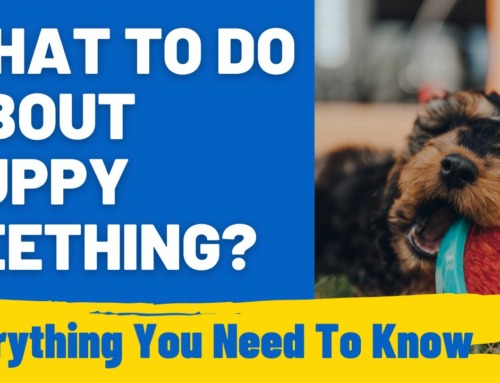Is your Boxer puppy throwing up? There are many reasons that they may be vomiting. Some of these can be very severe, but some are very easy to treat without having to visit your vet. If your Boxer puppy does continue to vomit, it is best for your puppy to see your vet.
There are many reasons that your Boxer puppy may be vomiting. These are a few of the different reasons that may be causing your Boxer puppy to vomit:
- Parvovirus
- Eating too fast
- Ate a Foreign Object
- Parasites
- Change in Diet
If your puppy continues to vomit more than once or twice in a 24-hour period or vomits a few times during the week, it would be best for your boxer puppy to see a vet.
Five Most Common Reasons that your Boxer Puppy May be Vomiting
These are the most common reasons that your boxer puppy may be vomiting and what you can do to stop them from vomiting.
Parvovirus
Parvovirus is a common virus seen in unvaccinated puppies. This virus causes your dog to vomit, have bloody diarrhea, and be very lethargic. Parvovirus is very contagious and may even be life-threatening. Your vet can test your puppy for parvo and start your Boxer puppy on treatment for this virus.
Unfortunately, there is no one medication that will kill the virus. There are many different medications that your Boxer puppy may need to help manage its symptoms. As soon as you start to notice that your Boxer puppy may have parvovirus, it would be best to take your puppy to the vet.
Eating too fast
Many Boxer puppies really like to eat! If your boxer puppy is eating very fast, they may vomit right after eating. It’s best to try to slow your Boxer puppy down when they are eating.
Inhaling their food can commonly lead to bloat when they get older. You can try to give them only a few pieces at a time to slow them down or use a slow feeder bowl. These make it a little harder for your puppy to be able to eat a large amount at one time.
We like this option from Chewy: Outward Hound Fun Feeder. It’s affordable and has a great design.
Be sure to also read our post Puppy Eating Without Chewing: (Is fast eating a problem?)

Ate a Foreign Object
Puppies, especially large breed puppies such as Boxers, are known to eat things that they should not eat. These things can easily get stuck in their intestines and cause them to throw up their food, or the foreign objects they’ve consumed.
Many common things that have been removed from Boxer’s intestines are socks, underwear, pieces of toys, or sticks.
These dogs will be vomiting but can still be very happy, playful, and may even still be eating their food!
If your Boxer puppy is vomiting, is still active and eating, start to look for a missing toy or sock. Your vet can take x-rays to look for a foreign object, but this can be very hard to see if it’s something soft like a sock. Your vet can give your dog barium, which is a special dye, that will help it be much easier to see.
If your Boxer puppy did eat something that they should not have eaten, they might have to have emergency surgery to remove this from their intestines.
Parasites
Puppies commonly get parasites. They are outside in the yard, eating bugs and dog poop. These can all cause them to vomit.
Your vet should check your puppy for any parasites when they’re getting their puppy vaccines, and they can deworm them for any of the parasites that they may have.
There are many different types of parasites, but these are the most common types of parasites that puppies can get:
- Roundworms
- Hookworms
- Tapeworms
- Whipworms
If you see any parasites in your puppies’ stool or if they vomit any parasites up, it would be best to take your puppy and these worms to the vet.
It’s a good idea to deworm your puppy regularly. For an affordable option for puppies we like Sentry HC WormX Plus which will cover your puppy for roundworms, hookworms and tapeworms.
Change in Diet
If you have just gotten a new puppy and are switching their diet, this may cause them to have an upset stomach.
They may vomit or have diarrhea if there is a sudden change in their diet. Puppies also are great at getting into things that they shouldn’t, like the trash!
If they ate any of the food that you had discarded into the trash, this could cause them to have an upset stomach or vomit. When switching diets, it’s best to do so very slowly. This will decrease the chance of upsetting your puppies’ stomach.
Here is a chart to show you how to transition to a new puppy diet:
| Day | Old Food | New Food |
|---|---|---|
| 1-2 | 90% | 10% |
| 3-4 | 80% | 20% |
| 5-6 | 70% | 30% |
| 7-8 | 60% | 40% |
| 9-10 | 50% | 50% |
| 11-12 | 40% | 60% |
| 12-14 | 30% | 70% |
| 15-16 | 20% | 80% |
| 17-18 | 10% | 90% |
| 19-20 | – | 100% |
What Can I Do at Home?
If your dog is vomiting, there are a few things that you can do to help your puppy feel better before having to go to your vet. These are a few things you can do to help stop your dog from vomiting at home:
Feed a bland diet
It’s best to remove their food for about 12-hours to allow their stomachs to settle down.
After this time, give them a bland diet of boiled chicken and rice. Make sure that this does not contain any spices or oils. This bland diet should help your puppy’s stomach to decrease any inflammation while still getting the nutrients that they need.
There are also some dog foods such as Hill’s I/d that are a very bland diet that you can feed without having to cook for your dog.
Slow down their eating
If your Boxer puppy starts to vomit right after they’re eating, try to make them slow down. This may be feeding many small meals throughout the day, putting their food dog toy puzzles, use a slow feeder bowl to help make them eat even slower.
There are a few at-home tricks you can try to help slow down their eating, such as:
- Spread food on the floor. This makes them have to walk around the room to pick up all the pieces of food, which will slow them down.
- Put their food in a muffin pan. These small openings allow only a small amount of food to fit in the muffin parts, making your puppy eat slower during these times.
- Put a large can of beans in their bowl. This can make your dog have to work around the can to get their food, causing them to eat a little slower.

When should I see my vet?
Sometimes you can just treat your puppy’s vomiting at home with a change in diet and slowing down your puppy eating.
There are sometimes though that it’s just best to take your dog to the vet. These are scenarios that you should not wait and take your dog to the vet:
- Continuing to vomit or vomiting more than 2 times in 24 hours – If your Boxer puppy is still vomiting despite anything that you are doing, it’s best to take your dog to the vet.
- Had diarrhea – If your dog also had diarrhea or bloody diarrhea, then your Boxer puppy needs to see your vet. Puppies with bloody diarrhea can be due to parvovirus or parasites and really need to see a vet right away for medication
- Your Boxer is lethargic – If your Boxer is vomiting and lethargic, it’s best for you to vet to look at your puppy. Your Boxer puppy should be very active and energetic
- Missing an object such as a sock – or if you suspect that your Boxer puppy ate something that they should not have eaten. Boxers commonly eat things that they should not. If you are missing a sock and your puppy is vomiting, they may not be able to pass the obstruction. If this is the case, they may require surgery. In any case, get them to their vet for a check up.
Final Thoughts
Vomiting many not mean that your Boxer puppy has something wrong with them; they may just be vomiting due to a change in diet.
There are many things that you can do to help them feel much better at home. If they don’t start to improve in a day or it starts to get worse, it’s best to see your vet. They can start them on medication and run tests to figure out exactly what is causing your Boxer puppy to vomit and get them back to their normal healthy and happy life.




